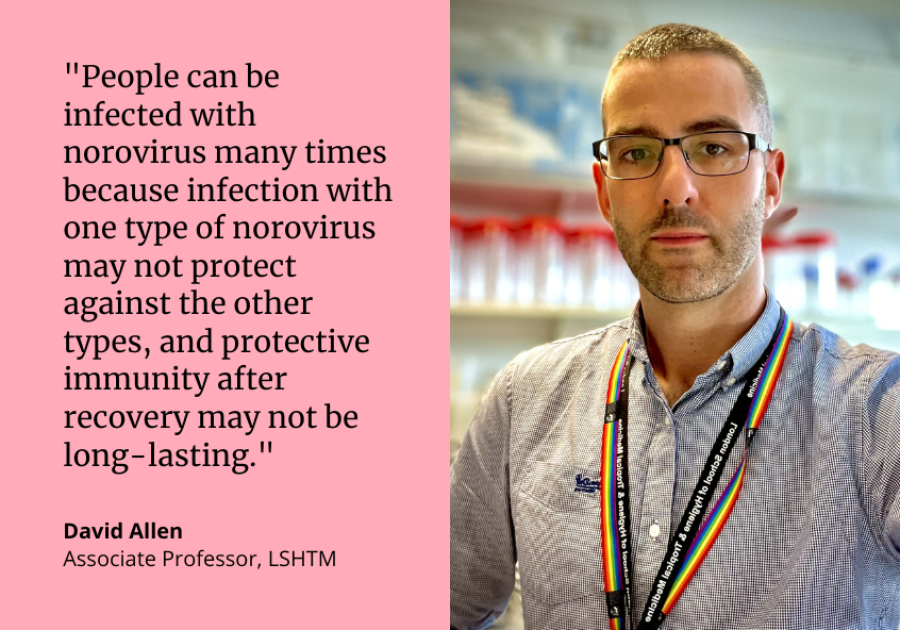Expert Comment – Unseasonal rise in UK norovirus cases
21 May 2024 London School of Hygiene & Tropical Medicine London School of Hygiene & Tropical Medicine https://lshtm.ac.uk/themes/custom/lshtm/images/lshtm-logo-black.png
"People can be infected with norovirus many times because infection with one type of norovirus may not protect against the other types, and protective immunity after recovery may not be long-lasting." David Allen, Associate Professor, LSHTM
Recorded norovirus cases for this time of year are at their highest level in five years, according to data published by the UK Health Security Agency (UKHSA).
Norovirus is the most common cause of gastroenteritis worldwide. In the UK, the virus is commonly referred to as the ‘winter vomiting bug’, as it’s usual for cases to peak in the winter months. However, cases do occur all year-round.
The virus is extremely transmissible and infections can be easily passed through contact from person to person. While most people make a full recovery within a few days, it can be dangerous for vulnerable groups.
Commenting on which factors may be contributing to the unseasonal rise in cases, Dr David Allen, Associate Professor in Virology at the London School of Hygiene & Tropical Medicine (LSHTM), said:
“The recent report from UKHSA showing an unseasonal rise in norovirus activity during weeks 16 and 17 of 2024 is an interesting and important observation. There are many factors that could contribute to this out-of-season activity, which include both environmental factors as well as those related to the virus.
“In the UK, temperatures in April have been cold, meaning people were more likely to be indoors. As norovirus spreads rapidly, especially in confined spaces, this could be a contributing factor.
“Indeed, the reported rise in norovirus cases has also been seen in adults aged 65 years and over, and more outbreaks have been reported in health and social care settings, which are prone to outbreaks of norovirus as transmission can be higher.
“The data from UKHSA also shows some change in the type of norovirus causing infections in early 2024.
“Norovirus is a diverse group of viruses with many different types. People can be infected with norovirus many times because infection with one type of norovirus may not protect against the other types, and protective immunity after recovery may not be long-lasting.
“Whilst the most common type of norovirus found worldwide, GII.4/2012, remains the most commonly detected in the UK and accounted for 40% of cases in 2023-24, in the early part of this year, a different group, called GII.17, has been associated with an increase in the proportion of norovirus cases. Research suggests that being previously infected by GII.4 viruses may not protect against infection with GII.17 norovirus.
“Changes to the epidemiology of norovirus following the COVID-19 pandemic, and changes in sampling, testing and reporting patterns to national surveillance systems, may also be contributing factors.
“There is a lot we still do not understand about how immune systems respond to norovirus infection. Continuing surveillance for norovirus cases, outbreaks and using sequencing to characterise the norovirus types associated with these cases, will be essential for understanding the current trend and to inform public health responses.”
If you enjoyed this article and would like to build a career in global health, we offer a range of MSc programmes covering health and data, infectious and tropical diseases, population health, and public health and policy.
Available on campus or online, including flexible study that works around your work and home life, be part of a global community at the UK's no.1 public health university.